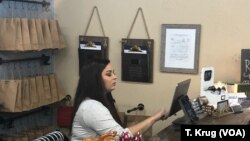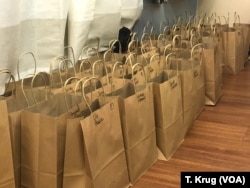Even in the country that invented the internet, access has remained painfully slow for many rural residents in places like the central state of Arkansas, far from the big cities of the East and West coasts. That may be about to change.
The Federal Communications Commission — a government agency — recently auctioned off almost $1.5 billion in subsidies to get broadband providers to serve an additional 700,000 American homes over the next 10 years. Additional such auctions are planned.
For rural residents in Arkansas — ranked as one of the worst connected states in the country — it cannot come too soon.
"Remember dial-up?" That's how Ashley Vaughan responds when she's asked to describe her internet speed at home. She's a resident of Pangburn, Arkansas, a town of about 600 people. After leaving the area for a few years, she returned in 2015.
"[Internet speed is] still as crappy as it ever was," Vaughan said. "I was trying to watch Hulu [a streaming network], and my husband was trying to load a webpage at the same time, and neither of them worked."
Rural areas
The issue of poor broadband access — defined by the FCC as fewer than 25 megabits per second (Mbps) — is not uncommon. Almost 20 percent of the American population, or 60 million people, live in rural areas, which generally experience the least connectivity in the country.
Of those, around 15 million Americans have access to less than 10 Mbps.
In Vaughan's case, she says her internet speed is only 0.05 Mbps. She's called her internet provider to complain, but was told her service was the best available where she lives.
To get around the problem, many communities have sidestepped big companies and created municipal networks. Individually, some people spend extra on portable broadband access for their phones.
That slow speed doesn't just mean fewer shows watched or video games played. It also impacts Vaughan's son's schoolwork, which increasingly requires use of a computer. Vaughan describes an instance in which her son took hours to download a single textbook, preventing anyone else in the house from using the internet during that time.
Many households in the U.S. have been wired for DSL, or digital subscriber lines, permitting the transmission of high-speed internet data over telephone lines. Meanwhile, most suburban and urban areas have seen the installation of fiber and copper cables, providing faster service. But many rural areas have been left behind.
"Fiber lines are expensive to install, and older copper lines are expensive to maintain," said Jameson Zimmer, a broadband analyst with BroadbandNow, a data aggregation company based in Los Angeles.
On average, Zimmer says, it can cost tens of thousands of dollars to run fiber lines, depending on the complexity of the terrain and the length of the line. This means there are fewer internet providers willing to take on that financial burden — giving consumers fewer options.
"What to do about this is overwhelming," Zimmer said.
Legislative push
It's a problem that both Republican and Democratic party leaders are working to solve.
U.S. Senator John Boozman of Arkansas has been one of the leaders in the push for legislation broadening access to high-speed internet.
In an email to Voice of America, Boozman wrote that investing in affordable, high-speed internet would strengthen the American economy. He applauded President Donald Trump for signing an executive order earlier this year to expand broadband access into rural areas but said the issue needs attention from "all levels of government."
"There is a sense of urgency in the need to close the rural broadband gap. Today, reliable connectivity is just as essential as traditional infrastructure like roads and bridges," Boozman wrote. "I've seen students sitting in the back of pickup trucks outside of schools in order to access the internet to complete their homework."
Alisha Summerville feels that urgency. She's a co-owner of the online store ASK Apparel, which launched last year and is based in Pangburn. Even though she relies on her smartphone to do most of her work, the store earns $10,000 to $15,000 a month from online purchases and sells to customers in 18 states.
The store earns an additional $5,000 to $10,000 through a brick-and-mortar store in the neighboring town of Heber Springs, but Summerville says the company was set up to serve online shoppers and it encourages foot traffic to become online traffic.
"That's where business is going," Summerville said of internet sales.
Summerville says she takes her internet connection into consideration every single time she makes a decision — from marketing and design to the equipment she uses. Having better broadband access at home would mean she could accomplish a lot more.
"When your internet is down, so is your business," Summerville said. "When I'm thinking about internet, and I'm thinking about sales, I'm thinking about how much further we could reach."







